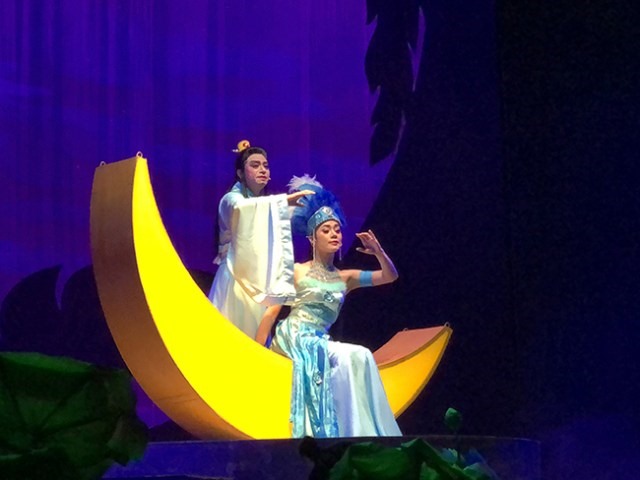 Life & Style
Life & Style

Awards for talented artists were given out at the National Cải Lương (Reformed Opera) Festival 2018, which closed on Wednesday in Tân An City, Long An Province.
 |
| A scene from Chiếc Áo Thiên Nga (Swan Coast), a historical play staged by the Việt Nam Cải Lương Theatre of Hà Nội, won the Golden Prize for Best Play and for Best Director at the 2018 National Cải Lương ( reformed opera) Festival in Long An Province yesterday.— Photo courtesy of the producer |
HCM CITY — Awards for talented artists were given out at the National Cải Lương (Reformed Opera) Festival 2018, which closed on Wednesday in Tân An City in Long An Province.
People’s Artist and female theatre director Hoàng Quỳnh Mai brought home the Best Director award for her works Chiếc Áo Thiên Nga (Swan Coat) and Kiếp Tằm (Fate of a Singer), both of which shared the Golden Prize for Best Play.
Chiếc Áo Thiên Nga was staged by the Việt Nam Cải Lương Theatre of Hà Nội, while Kiếp Tằm was a production by Quảng Ninh Traditional Art Troupe of Quảng Ninh Province.
The Golden Prize for Best Play also went to leading theatres in the southern region, including Trần Hữu Trang Cải Lương Theatre and Thế Giới Trẻ Theatre of HCM City, Long An Province Cải Lương Theatre and Đồng Nai Province Traditional Art Theatre.
Giới Trẻ Theatre’s Tổ Quốc Nơi Cuối Con Đường (The Country), a drama staged by young actors, left a strong impression on audiences.
The play is based on true stories about soldiers who sacrificed their lives for the country’s independence.
The producer, HCM City University of Theatre & Cinematography, invested several hundred million đồng in costumes as well as sound and light effects.
They also used a music troupe to perform live on stage instead of playing recorded music, which is the norm in cải lương.
Long An Province Cải Lương Theatre’s Cuộc Đời Của Mẹ (Life of the Mother) brought home a Golden Prize for Best Play and Best Scriptwriter for veteran authors Hoàng Song Việt and Triệu Trung Kiên.
Organised by the Ministry of Culture, Sports and Tourism, the 14-day event attracted 25 theatres and troupes, including eight private troupes, most of them from HCM City and provinces in the Mekong Delta region.
Several hundred veterans and young performers were featured in 32 historical and social plays.
The organiser presented the Golden Prize for 49 of the best actors and best actresses, many of them young talents at provincial theatres.
The event also included forums and seminars on the art.
"Through the festival, we hope to draw theatre lovers back to cải lương, one of the country’s three traditional arts along with tuồng (classical drama) of the central region and chèo (traditional opera) of the north,” said People’s Artist Lê Tiến Thọ, chairman of the Việt Nam Theatre’s Association, and a member of the festival’s organising board.
“We want to encourage young talents, especially those working in directing and writing, to devote their lives to art,” he said.
A five-day festival celebrating 99 years of the song Dạ Cổ Hoài Lang (Night Drumbeats for the Absent Husband), that also honours cải lương (reformed opera) kicked off yesterday in the Cửu Long (Mekong) Delta province of Bạc Liêu.
The song was composed in 1919 by Cao Văn Lầu (1982-1976), a native of the province. It tells of the love, anguish and pride of a young woman who awaits her husband’s return from the battlefield as she listens to the sounds of war drums.
The festival will include a gala featuring performances of cải lương and tài tử (southern folk singing) music at the Cao Văn Lầu Theatre. More than 200 artists of traditional art troupes from Bạc Liêu, HCM City and neighbouring provinces will perform at the show.
There will also be a tài tử music contest, cải lương performances, a seminar on preserving traditional performance arts, and a tourism promotion seminar during the event.
The organisers will host a cultural exchange activity between the province and the northern province of Bắc Ninh, home of quan họ (love duet).
Two artists from the province will introduce performances of tài tử music and quan họ, which have been designated intangible cultural heritage by UNESCO, and traditional dances as well.
The songs have been performed thousands of times by generations of singers and cải lương musicians.
Dạ Cổ Hoài Lang was known as the first vọng cổ song, which quickly became popular across Việt Nam.
Vọng cổ songs are sung by southern farmers after working in the fields. The songs, which feature the feelings, dreams and hopes of people, are often used in cải lương.
Dạ Cổ Hoài Lang has been performed by generations of singers. Its title is also used for a cải lương play, drama and movie, in which the song is used to highlight nostalgia.
The plays and the film have impressed local and foreign audiences, especially Vietnamese living in other countries. — VNS